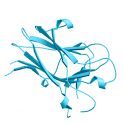
- Remove this product from my favorite's list.
- Add this product to my list of favorites.
Products
Newsletter
 |  |  |  |  |  |

Background: EPHA4 is part of the ephrin receptor subfamily of the protein-tyrosine kinase family. EPH and EPH-related receptors have been implicated in mediating developmental events, particularly in the nervous system. The Eph family receptors can be divided into two groups, EphA and EphB, based on the sequence similarities of their extracellular domain. Expression of EphA4 is found predominantly is in the final stages of embryogenesis.
Human EPHA4 (Ephrin type-A receptor 4), amino acids S570-V986, tyrosine kinase domain, recombinant and active enzyme, N-terminal GST-HIS6 fusion protein with a 3C cleavage site
Theoretical MW: 76.656 kDa (fusion protein)
Expression system: Baculovirus infected Sf9 cells
Purification: One-step affinity purification using GSH-agarose
Storage buffer: 50 mM Tris-HCl, pH 8.0; 100 mM NaCl, 5 mM DTT, 15 mM reduced glutathione,
20% glycerol
Protein concentration: 0.628 mg/ml (Bradford method using BSA as standard protein)
Method for determination of Km value & specific activity: Filter binding assay MAFC membrane
Specific activity: 18,900 pmol/mg x min
Entrez Gene ID: 2043
UniProtKB: P54764
Ordering information: shipped on dry ice
Egea J, Nissen UV, Dufour A, Sahin M, Greer P, Kullander K, Mrsic-Flogel TD, Greenberg ME, Kiehn O, Vanderhaeghen P, Klein R.(2005) Regulation of EphA 4 kinase activity is required for a subset of axon guidance decisions suggesting a key role for receptor clustering in Eph function. Neuron. ;47(4):515-28.
Coulthard MG, Morgan M, Woodruff TM, Arumugam TV, Taylor SM, Carpenter TC, Lackmann M, Boyd AW. (2012) Eph/Ephrin signaling in injury and inflammation. Am J Pathol. 2012 Nov;181(5):1493-503.
Welcome Login
Contact us
Follow us